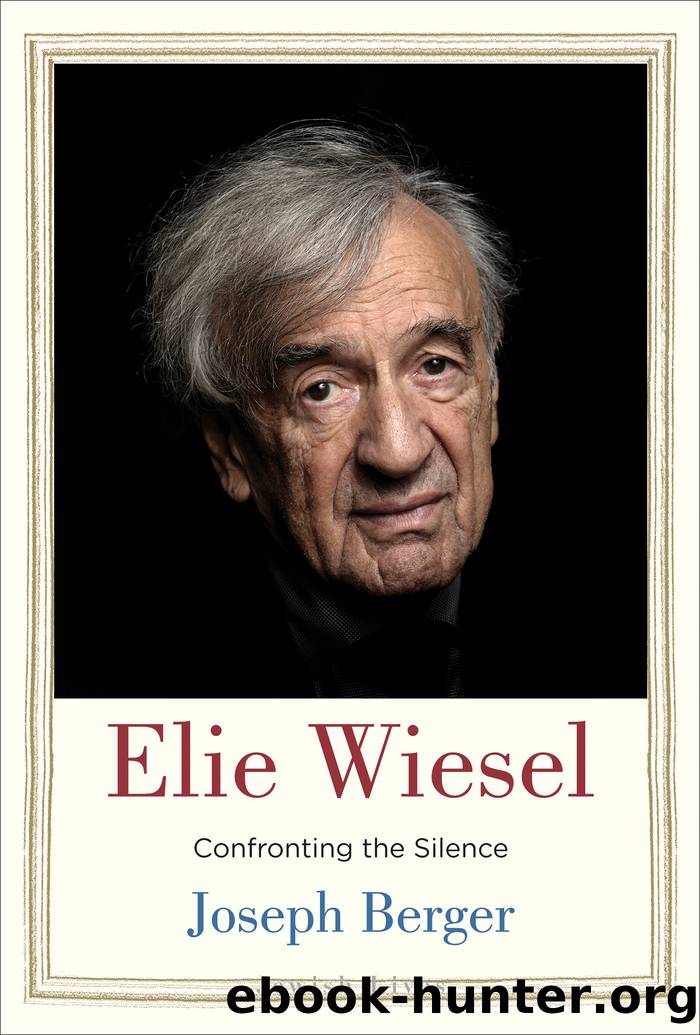Elie Wiesel by Joseph Berger;

Author:Joseph Berger;
Language: eng
Format: epub
Publisher: Yale University Press
Published: 2023-06-15T00:00:00+00:00
20
World Stage
AS MUCH AS HE identified himself as an ardent Jew, Wiesel was always cosmopolitan in outlook, never insular. Early on in his advocacy for the survivors of the Holocaust, he recognized that he could not genuinely condemn the world for its indifference to imperiled Jews if he remained indifferent to the suffering of other peoples. The chairmanship of the council offered him a platform to become an international spokesperson for many groups under siege.
Wiesel had been moving in that direction even before his appointment. In May 1972, for example, he gave the commencement address at Manhattanville College in Westchester County, which had been founded as a Catholic womenâs college but had become nondenominational and co-ed. He had been chosen by the senior class, whose predominantly Christian students were taken with his writings and lectures. He spoke to the 337 graduates and their families not just about the Holocaust but also about the still-raging Vietnam War, the conflict in Northern Ireland, and the racial tensions at home. âI pity you,â he said, âbecause the world which is not yet ready to receive you is full of horrors, full of violence, full of absurdity.â Never, he said, âhas society been so dehumanized as it is now. Words mean nothing. What is even worse, . . . lies come out as words of truth.â
âMy idea in my story telling is to make Jews better Jews, and Christians better Christians, and in general, if possible at all, make man a little bit warmer, so he will not feel crushed by his own solitude,â he said. âI have learned that in extreme situations, those who were good become better, those who were bad become worse. . . . I have learned the value of tales that have to be transmitted, and we are all carriers and messengers of tales from one to another.â1
Wiesel visited South Africa in 1975 to witness the workings of apartheid first-hand. Ten years later he wrote an op-ed for the Times in which he admitted that as a white man he felt shame visiting the shantytowns of the black township of Soweto outside Johannesburg because âSouth African law has declared him superior. . . . Racism itself is dreadful but when it pretends to be legal and therefore just, it becomes altogether repugnant.â
In 1977, the French government, after appeals from the Palestinian Liberation Organization and Arab governments, freed Abu Daoud, the terrorist who had masterminded the massacre of eleven Israeli athletes at the Munich Olympics five years earlier, and put him on a plane to Algeria. Wiesel, again capitalizing on his rising stature, arranged for a full-page ad in the Times written as an open letter to President Valéry Giscard dâEstaing assailing Franceâs decision. âI owe France my secular education, my language, and my career as a writer. Liberated from Buchenwald, it was in France that I found compassion and humanity. . . . France, to me, represented humanityâs highest values in a sterile and cynical society.â But the freeing of Abu Daoud âbetrayed its own traditions.
Download
This site does not store any files on its server. We only index and link to content provided by other sites. Please contact the content providers to delete copyright contents if any and email us, we'll remove relevant links or contents immediately.
Down the Drain by Julia Fox(965)
The Light We Carry by Michelle Obama(881)
Cher by Cher(790)
Simple Passion by Annie Ernaux(738)
Love, Pamela by Pamela Anderson(595)
Zen Under Fire by Marianne Elliott(557)
The Nazis Knew My Name by Magda Hellinger & Maya Lee(545)
You're That Bitch by Bretman Rock(542)
Novelist as a Vocation by Haruki Murakami(530)
The Foxfire Book of Appalachian Women by Kami Ahrens(518)
Alone Together: Sailing Solo to Hawaii and Beyond by Christian Williams(518)
Kamala Harris by Chidanand Rajghatta(490)
Gambling Man by Lionel Barber(480)
The Barn by Wright Thompson(430)
Drinking Games by Sarah Levy(421)
Limitless by Mallory Weggemann(411)
Memoirs of an Indian Woman by Shudha Mazumdar Geraldine Hancock Forbes(407)
A Renaissance of Our Own by Rachel E. Cargle(405)
A new method to evaluate the dose-effect relationship of a TCM formula Gegen Qinlian Decoction: âFocusâ mode of integrated biomarkers by unknow(396)
